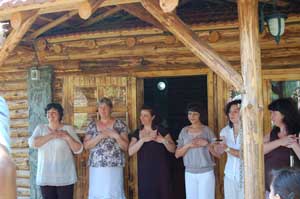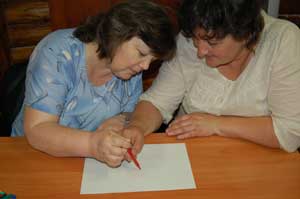Rethinking training for mainstream teachers, Bulgaria
Margarita Asparuhova
Our overall approach
In 2007 we began to design and organise trainings for mainstream teachers on how to support and teach children with special educational needs in a mainstream setting. At that time most Bulgarian teachers were still having doubts about the benefits of inclusive education and were unsure about having a child with disabilities in their classroom.
In our work at Centre for Inclusive Education (CIE) we have always tried to apply innovative methods. Our trainings seek to present new knowledge and new approaches to inclusion that correspond to the needs of the local school reality. We therefore aim to:
- make teachers’ attitudes towards inclusive education more positive;
- support mainstream teachers on how to provide an inclusive environment for their students;
- help mainstream teachers establish and develop a team-work approach in their collaboration with parents and with specialists who support students within the school;
- encourage teachers to identify, use and praise their students’ strengths;
- share with teachers examples of good practice from the practical experience of our trainers;
- involve teachers in case study discussions and group workshops, thus facilitating them to question their own practices and at the same time encouraging them to trust their own professional experience and teaching approaches;
- raise awareness and focus attention on so-called invisible disabilities, such as dyslexia, dysgraphia, dyspraxia, ADHD and autism.
Although CIE provides thematic trainings for mainstream teachers on how to support children with special educational needs in mainstream settings, our organisation is not a typical training organisation. Our team is presently involved in a number of inclusion-related projects, which gives us the opportunity to take a more critical approach to the way we provide trainings for mainstream teachers and other stakeholders (specialists, support teachers, parents). This connection with the reality of project work enables us to make informed alternations to our training, so that we meet the target groups’ needs and ultimately reach our goal of developing more welcoming schools, more confident teachers, more content parents and, of course, more happy children.
Our projects
Our project, ‘One School for All’,1 aims to adapt and apply widely in Bulgaria the third edition of the Index for Inclusion.2 The project has proved that teachers’ attitudes can be altered in deeper and broader dimensions through an attentive and respectful facilitation of self-reflection on values, own practices and goals. Thus, teachers have been able to assess critically their own concepts and actions and change them in accordance with the needs of other stakeholders (children, parents, and peers).
Another CIE project, ‘School is My Right Too’,3 involves stakeholders from two schools and two kindergartens in one Bulgarian town. It seeks to collect in one place the perspectives of teachers, specialists, parents, children and local education authority representatives regarding the opportunities and challenges for developing inclusive education for children with special educational needs, aged 3 to 10 years. This project has allowed us to go beyond a ‘preaching’ approach to teacher training and use more participatory approaches, such as focus group discussions, child participation sessions that inform adults, and learning-through-experience workshops for capacity building.
CIE is also a partner within the EU project FIESTA4 (Facilitating Inclusive Education and Supporting the Transition Agenda). This project has played a major role in the refinement of our teacher training agenda. As part of the project, literature and field research was conducted in 8 EU countries to inform a best practice report on inclusion, transition management and collaborative working.5
Changing the focus of training
In refining our teacher training agenda we have been moving the focus from diagnosis- based thematic trainings, to seminars that intend to lead to a more profound approach to understanding children’s current abilities and disabilities. Such an approach relies mainly on direct and informed observation within the context of the child’s cultural and social background.
For example, four years ago the term ‘dyslexia’ was hardly known by practitioners. Now it tends to be overused for explaining all forms of reading difficulties, potentially shifting attention from other possible reasons why children are experiencing reading challenges (such as children experiencing emotional trauma or vision or hearing challenges; teachers’ inability to teach using a style or pace that the student prefers, etc).
As such, a ‘diagnosis approach’ is not helping teachers to support learners effectively. Conditions such as dyslexia, ADHD and autism manifest themselves in spectrums, and it is impossible to train a teacher how to teach a student with such challenges through just a one-day training. A more effective approach is to train teachers more broadly on how the various learning mechanisms operate (memory, attention, executive functions, etc); how to identify certain troubles with them; and what strategies can help reinforce these learning mechanisms. It is also important that teachers are trained to confidently discuss these matters with the children’s support specialists, their parents, and, of course, with the children themselves.
Even though currently many teachers still expect to be given ready-made recipes for solving challenges, increasing numbers of them have benefited from the more holistic, self-reflection, and participatory approaches to training CIE has offered. Such shifts in the teacher training agenda are more time- and effort-consuming, but they are possible and worthwhile. Moreover, they are a logical and necessary step towards welcoming children with special educational needs into mainstream schools.
Centre for Inclusive Education (CIE) is a Bulgarian non-governmental organisation, whose main aim is to promote inclusive education for every child. CIE continues the ten years of work initiated by Save the Children UK in Bulgaria and the region. CIE believes that every child should be given the chance to be accepted and valued, and is working for social inclusion and quality education for all children and to protect those in need. CIE’s team works with parents, teachers, managers, professionals, local and state authorities, business organisations, national and international colleagues.
Margarita Asparuhova, Project Manager, Centre for Inclusive Education
Bulgaria, Sofia 1000, 60 Ekzarh Yosif Str, m.asparuhova@cie-bg.eu
|
Building relationships for inclusion
|
|
 |
 |
| A group of mainstream teachers, specialists and resource teachers is communicating to other participants an idea with gestures only. The aim of the activity is to emphasise empathy and attentiveness in education. | A mainstream and a resource teacher are drawing together with one pencil. The aim of the activity is to provoke self-reflection on team working, leading and following a lead. |
| In 2013, as part of the ‘School is My Right Too’ project, CIE facilitated a workshop focused on strengthening the relationships – mutual trust and partnership – between mainstream teachers, specialists and resource teachers who support children identified as having special educational needs in mainstream settings. | |
| “The feedback received from the participants was mainly focused on the benefits from actually meeting the ‘others’ and thus having a better understanding of each other’s responsibilities, aspirations and challenges, which, in their own words, would improve their future collaboration.” Maria Tasheva, project coordinator. | |
| We will provide a longer article about the impact of this workshop on participants’ perceptions of each other’s roles, and on the way they work together, for EENET’s 2014 edition of ‘Enabling Education Review’. | |
| The Index for Inclusion is mentioned in several articles in this newsletter.
What is it? Where can you get copies? Where can I find out more about using the Index? |
1 ‘One School for All’ project is financed by the European Social Fund through Operational Program ‘Human Resources Development’
2 ‘Index for Inclusion: Developing Learning and Par- ticipation in Schools’, Booth, T., Ainscow, M., revised by Tony Booth, 2011, published by Centre for Studies on Inclusive Education, UK
3 ‘School is My Right Too’ project is (partially) financed by Open Society Foundations
4 FIESTA project is funded with support from the European Commission.
5 The report will be available online by the end of 2013: www.fiesta-project.eu
